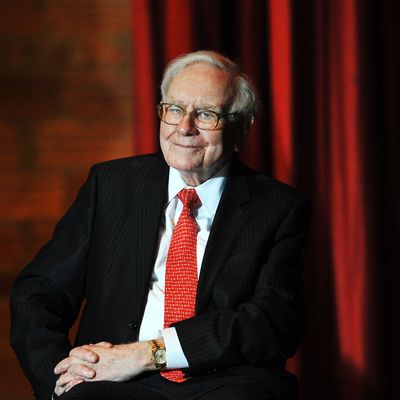
Earlier this month, Paul Ryan (briefly) published the following testament to the success of the GOP tax cuts:
In the House Speaker’s apparent estimation, the fact that this secretary had gained a full $6 in monthly income was a devastating rebuttal to the tax law’s progressive critics. After all, how could any sincere advocate for the middle class object to a $1.5 trillion tax cut that delivers the bulk of its benefits to the superrich — and that will eventually, in Ryan’s estimation, require large reductions in federal spending on education, health care, and Social Security — when that legislation also gave a public-school employee access to the lowest level of membership that Costco currently offers?
Three weeks later, the multinational conglomerate that owns much of Costco revealed that its shareholders stood to benefit just a little bit more from the new tax code than that secretary in Lancaster:
Warren Buffett says the Trump tax cuts passed late last year were a huge win for him and his company, Berkshire Hathaway …
“Over the last 53 years (that is, since present management took over), per-share book value has grown from $19 to $211,750, a rate of 19.1% compounded annually,” he said. “But 2017 was far from standard: A large portion of our gain did not come from anything we accomplished at Berkshire. The $65 billion gain is nonetheless real — rest assured of that. But only $36 billion came from Berkshire’s operations. The remaining $29 billion was delivered to us in December when Congress rewrote the U.S. Tax Code.”
For context: The Department of Housing and Urban Development has estimated that it could end homelessness in the United States with an additional $20 billion a year in annual funding. The Century Foundation’s plan to lift 3.2 million American children out of poverty by providing their parents with a child allowance has a (projected) price tag of $17.7 billion a year. Alternatively, the government could give every man, woman, and child in the United States a one-year, Costco Gold Star membership for a little over $19 billion.
Public support for the GOP tax bill has moved steadily upward in recent weeks. Last December, the package was the second-most unpopular piece of major legislation to come before Congress in more than three decades; now, it has a (narrow) net-positive approval rating in several polls. Republicans have credited this shift to improvements in the public’s understanding of the law’s substance.
But there’s little evidence to support that premise. It’s true that when the Tax Cuts and Jobs Act was first passed, many Americans falsely believed that the bill did not cut their taxes, and that the percentage of Americans who recognize that they will, in fact, benefit from the law has crept up in recent surveys. Some Americans have, apparently, grown more supportive of the legislation as they’ve become better-informed of its contents.
But this does not appear to be typical. As the juxtaposition of Berkshire Hathaway’s $29 billion windfall — and the Lancaster secretary’s Costco Gold card — amply illustrates, the Trump tax cuts present ordinary Americans with a simple trade-off: Would you want a small tax cut for your family, if it comes at the cost of giant tax cuts for the rich, and thus leads to either a higher budget deficit or lower public spending?
The past year of polling suggests that a large majority of Americans would answer this question in the negative.
In any case, whatever has led a plurality of Americans to approve of the Republican tax bill (I’d put my money on the stock market’s January spike and simultaneous improvements in the macro-economy), it is not a national consensus that giving Berkshire Hathaway an additional $29 billion is a sound public policy, and well worth any spending cuts that such largesse might eventually necessitate.






























